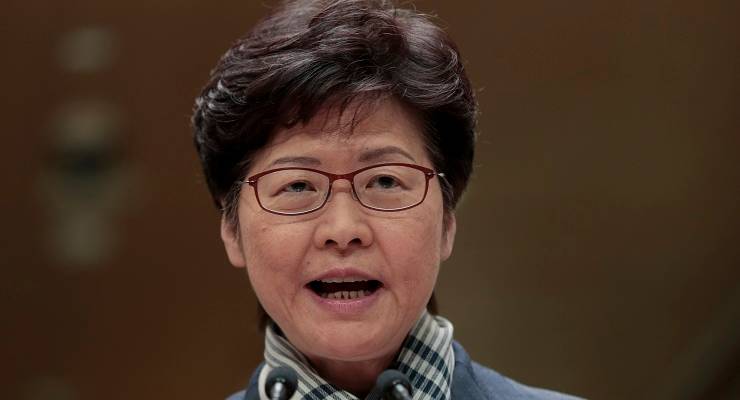
After a quiet six months following the 2019 Hong Kong protests, the clash over Beijing’s ever-creeping influence in the city resumed last weekend, with all eyes on September’s Legislative Council (LegCo) elections.
The latest moves by pro-Beijing lawmakers — who dominate the LegCo — have made clear the intentions of China’s ruling Communist Party (CCP) to “reform” the city’s education system, as well as to support a new bill that would see large fines issued to anyone “disrespecting” the Chinese national anthem.
“The schools seem to have become a lawless place that can unscrupulously promote heresies, attack the ‘one country, two systems’ and discredit the nation state,” commentary on the website of state news wire Xinhua said.
“Some immature students have been tricked into use by the anti-China forces and have become pawns to disrupt Hong Kong.”
The moves follow the arrest of 15 veteran pro-democracy politicians — including the city’s so-called father of democracy, Martin Lee, last month — who have been charged with breach of unlawful assembly regulations. Last week, the charges were shifted to a higher court which can level heftier penalties, including long jail stints.
“Hong Kong people now face two plagues from China: the coronavirus and attacks on our most basic human rights,” Lee wrote in The Washington Post.
This shapes as the latest test for Hong Kong’s judiciary, which many fear is being chipped away by Beijing as China slowly installs more compliant judges.
It’s instructive that relatively small scale protests on May 10 in Hong Kong’s shopping malls — smaller guerrilla style groups designed to keep a step ahead of authorities — were met with a full frontal response from Hong Kong police, who used pepper spray, attacked lawmaker Roy Kwong and abused media representatives.
This has been seen by many observers as an escalation by authorities in response to protests.
Beijing has made its latest move on Hong Kong, under the cover of COVID-19, by appointing hard-line allies of leader Xi Jinping to its powerful Hong Kong and Macau Administration Office and Hong Kong Liaison Office.
Critics say these instruments are increasingly in charge of handing down policies set by CCP central. At the same time, Beijing has effectively declared that its agencies have the right and the power to intervene in Hong Kong, thus further weakening the Basic Law — the de facto constitution that is supposed to guarantee “one country, two systems” until 2047.
If pro-democracy parties can manage to lock in the gains they made in last year’s council elections, they will build a larger bloc in the LegCo — a mix of elected and appointed representatives — which will prove more problematic for Beijing. Moving on controversial legislation and polices quickly would be a logical strategy.
A bolder approach to Hong Kong comes as part of Beijing’s determination to strike a freshly-confident pose on the global stage, after its lockdown program has seen it gain the upper hand against the spread of COVID-19, allowing it to reopen its economy ahead of other countries.
This confidence has also been on display by way of the aggressive comments of its so-called “wolf warrior” diplomats, named after the rogue hero of an eponymous, box-office shattering Chinese nationalistic action series.
So the rapid escalation in Hong Kong’s political ructions comes amid a groundswell of pushback against China’s post-COVID diplomatic aggression.
It is Hong Kong that stands out as the litmus test for Xi Jinping’s program of surveillance and repression, and his appetite for riding roughshod over the status quo.
Australia has certainly been paying attention, with Foreign Minister Marise Payne speaking out on the protests last year — minding her words but at the same time making Australia’s intent plain.
As the Morrison government continues with its determined testing of China’s resolve, it has again added Beijing’s interference in Hong Kong to its critique of China.
“I am concerned by news of coordinated arrests on 18 April of 14 high-profile pro-democracy figures in Hong Kong for allegedly participating in unauthorised protests last year. The rights to freedom of speech and freedom of assembly are enshrined in the Basic Law for all people of Hong Kong,” Payne said in an April 20 statement.
“That this has happened in the midst of the global crisis stemming from COVID-19 is concerning. Actions that undermine stability are never acceptable, but to do so during a crisis of this magnitude erodes goodwill and trust.”
Beijing tends to react with fury at any perceived “interference” in its internal affairs and Hong Kong is front and centre here. So Australia’s comments on Hong Kong will have only served to further anger the Chinese leadership already seething about Morrison’s bid for an external investigation into the origins of the coronavirus.
They will also add a further degree of difficulty to any attempted “reset” of the rapidly deteriorating relationship with Beijing by Canberra.








These are not pro democracy protests, they are pro US protests evidenced by protesters carrying Old Glory.
I wonder how a pro-democracy movement would fare here or the Benighted States?
Not well, I suspect.
Obliterated between the vested interests of Scylla power, money, Morlock’s media, hierarchy and the Charybdis of money, power and … did I mention vested interests?